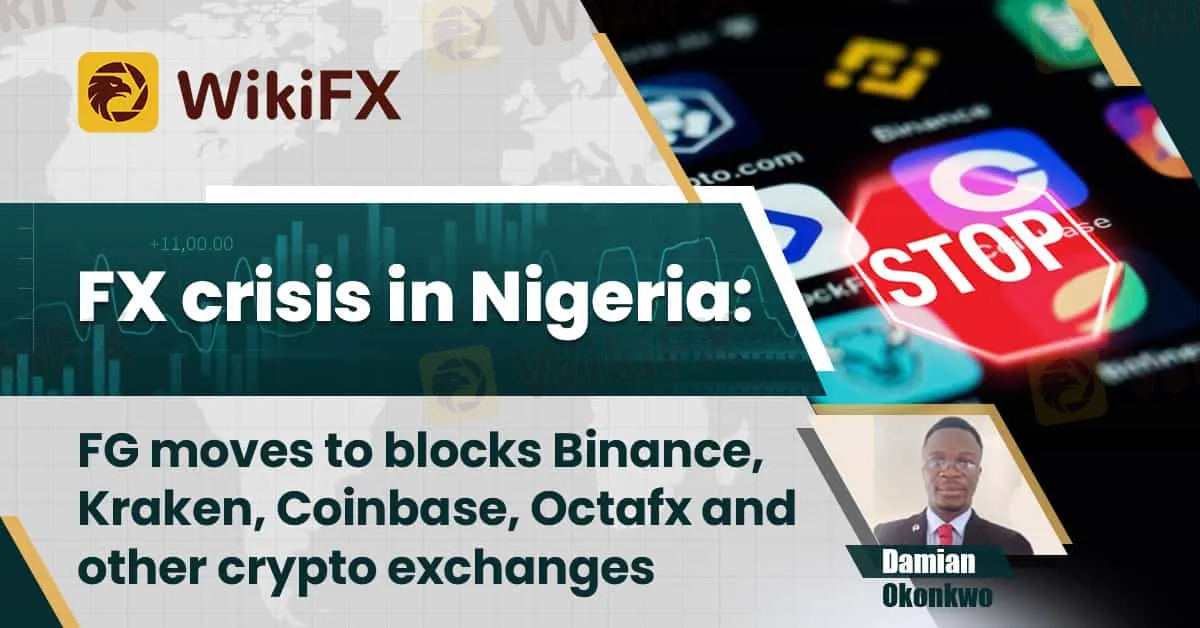简体中文
繁體中文
English
Pусский
日本語
ภาษาไทย
Tiếng Việt
Bahasa Indonesia
Español
हिन्दी
Filippiiniläinen
Français
Deutsch
Português
Türkçe
한국어
العربية
FX crisis in Nigeria: FG moves to blocks Binance,Coinbase, Octafx and other crypto exchanges.
Abstract:The Federal Government (FG) reportedly moved to block access to the websites of major cryptocurrency exchanges, including Binance, Kraken, Coinbase, OctaFX, and others due to their alleged contributions in the rising FX crisis in the country

By: Damian Okonkwo

Lagos, Nigeria, February 22, 2024 - In a move that sent shockwaves through the Nigerian financial landscape last week, the Federal Government (FG) reportedly moved to block access to the websites of major cryptocurrency exchanges, including Binance, Kraken, Coinbase, OctaFX, and others. This drastic action comes amidst a deepening foreign exchange (FX) crisis that has seen the naira fall to an all-time low against the US dollar, trading at N1900/$ on Wednesday February 22nd, 2024.
FG Government Cites Market Manipulation and Illicit Activity as the reason for the sudden move
Sources within the major telecommunication companies revealed that the Nigerian Communications Commission (NCC) received and implemented a directive from the presidency and regulatory bodies to restrict access to these crypto platforms. The government's rationale for this move stems from concerns about potential market manipulation and illicit fund movements contributing to the devaluation of the naira.
Authorities cite alleged Crypto Abuse by Speculators and Launderers using the crypto platforms
The Presidency and other regulatory bodies claimed that their decisions stemmed from reports of currency speculators and money launderers exploiting crypto platforms to engage in illegal activities. The belief is that these “criminal activities” are significantly contributing to the weakening of the naira.
Naira's Freefall Sparks Fears and Government Response
The naira had recently reached a record low against the US dollar last week at the parallel market. This has raised deep concern amongst Nigerians over the future of the economy. The unabated freefall of the Naira has led the government to explore various measures to stabilize the currency, including the controversial blocking of crypto exchanges in the country.
Critics Question Effectiveness of the decision and Raise Concerns over Freedom
While the government aims to curb alleged illegal activity and stabilize the forex market, the move has drawn sharp criticisms from many angles. Some critics argue that firstly, the evidence linking crypto platforms to the FX crisis is unsubstantiated and lacks concrete proof. Secondly, they express concerns over the restriction of individual freedom and the potential for hampering financial innovation.
Uncertain Future for Crypto in Nigeria
The long-term implications of the government's decision remain unclear. Whether this is a temporary measure or indicates a more permanent stance against cryptocurrencies in Nigeria is yet to be seen.
The situation is developing rapidly, and further details are expected to emerge in the coming days.

Disclaimer:
The views in this article only represent the author's personal views, and do not constitute investment advice on this platform. This platform does not guarantee the accuracy, completeness and timeliness of the information in the article, and will not be liable for any loss caused by the use of or reliance on the information in the article.
Read more

Forex Hedging: Is It a Trader’s Safety Net or Just an Illusion?
In the volatile world of forex trading, risk is inevitable. One widely used strategy is forex hedging, which is a useful technique designed not to eliminate risk entirely, but to reduce its potential impact. As global economic uncertainty persists, understanding how hedging works could be an essential addition to a trader’s toolkit.

OctaFX Back in News: ED Attaches Assets Worth INR 134 Cr in Forex Scam Case
The Enforcement Directorate (ED) in Mumbai has attached assets worth around INR 131.45 crore. This included a luxury yacht and residential properties in Spain. Read this interesting story.

Is forex trading profitable?
Many traders think that forex trading can make quick profits, but the truth is more complex. While some people do make money in the forex market, others fall prey to its many pitfalls because, in this industry, the scams and misleading promises are widespread.

Admiral Markets: A Mix of Regulation and Risk
Despite multiple licenses, Admiral Markets presents potential red flags that traders should not ignore, including a suspicious clone alert and disclosure by Malaysia’s Securities Commission.
WikiFX Broker
Latest News
Forex Hedging: Is It a Trader’s Safety Net or Just an Illusion?
OPEC+ members agree larger-than-expected oil production hike in August
Top Wall Street analysts are pounding the table on these 3 stocks
Stock futures fall after Trump team says tariffs will go into effect on Aug. 1: Live updates
FCA clarifies expectations on bullying, harassment and violence to deepen trust in financial service
Asia-Pacific markets mixed after Trump shifts goalposts on tariffs again
XS.com Expands Global Reach with Landmark Kuwait Launch
European markets set to open mixed amid fresh U.S. tariff threats
Asia-Pacific markets set for mixed open after Trump shifts goalposts on tariffs again
CNBC Daily Open: Most people don't start a political party after separation
Currency Calculator


